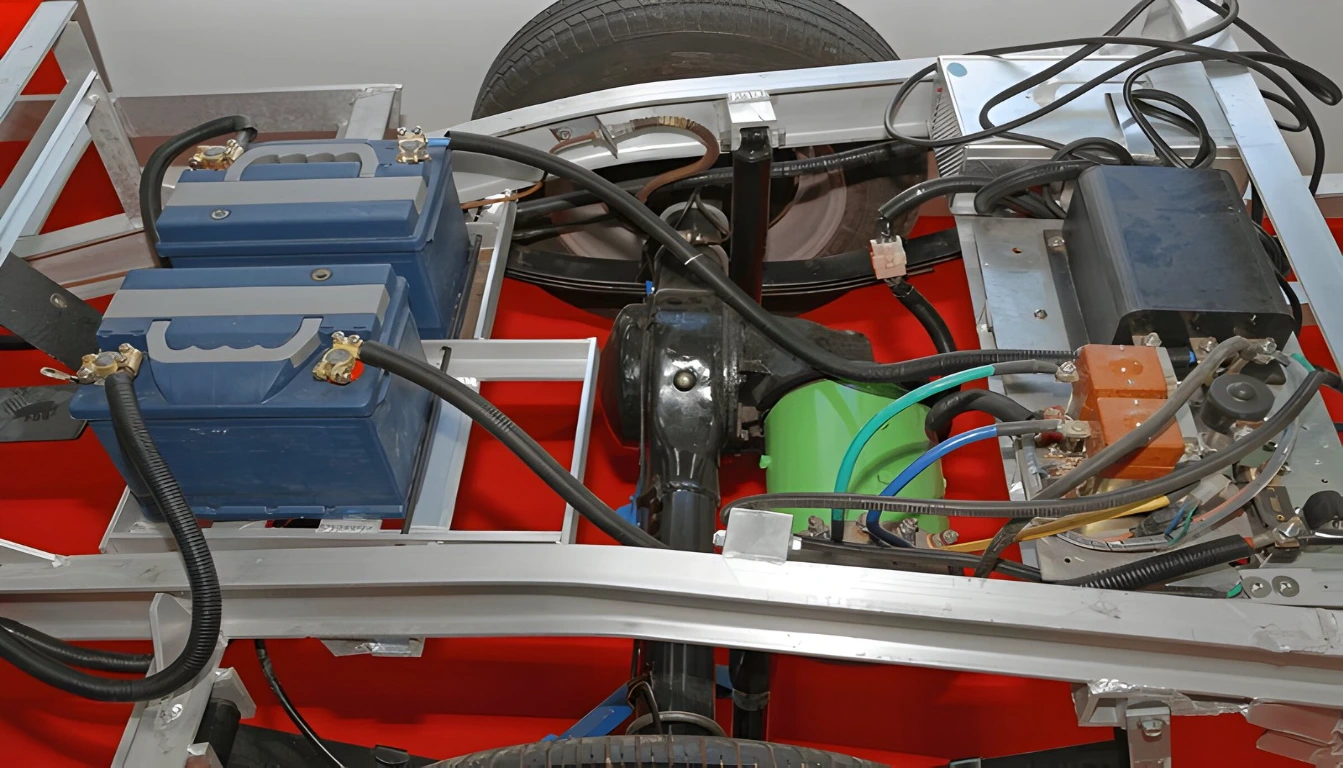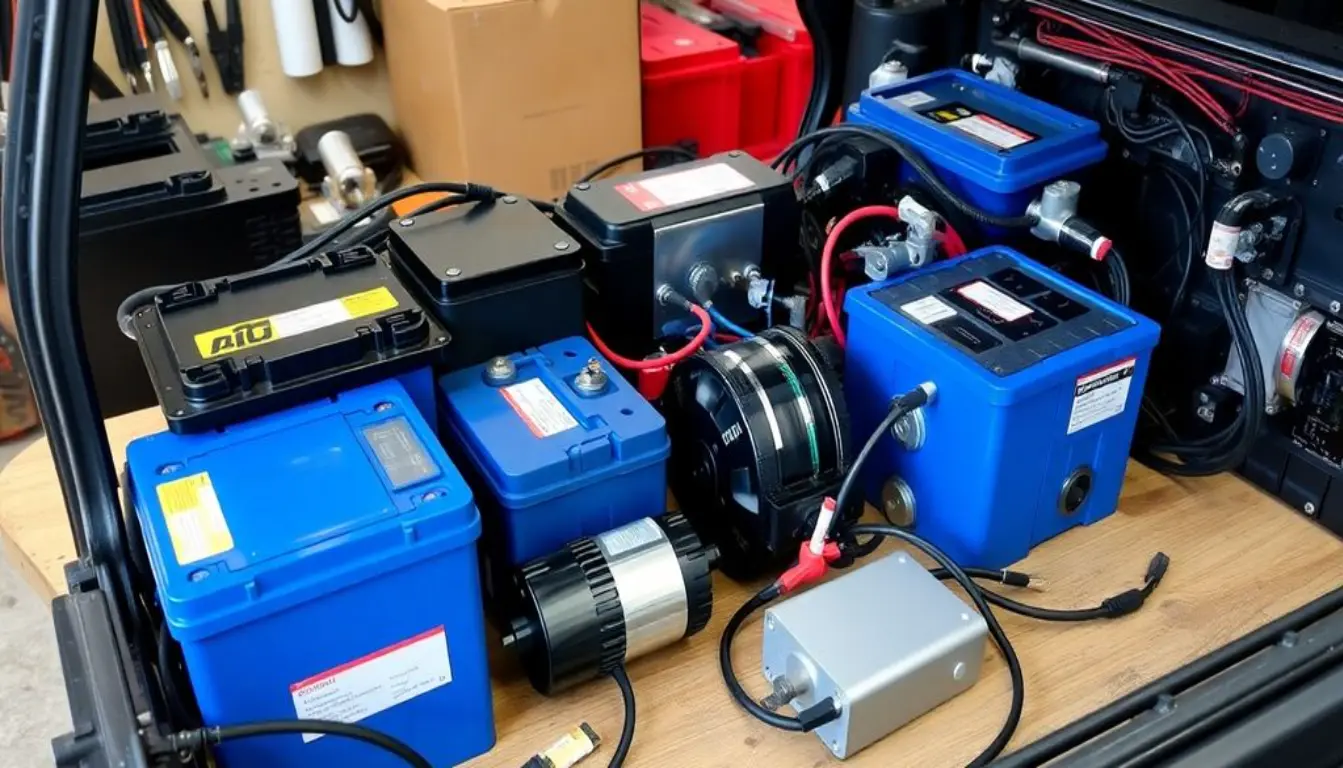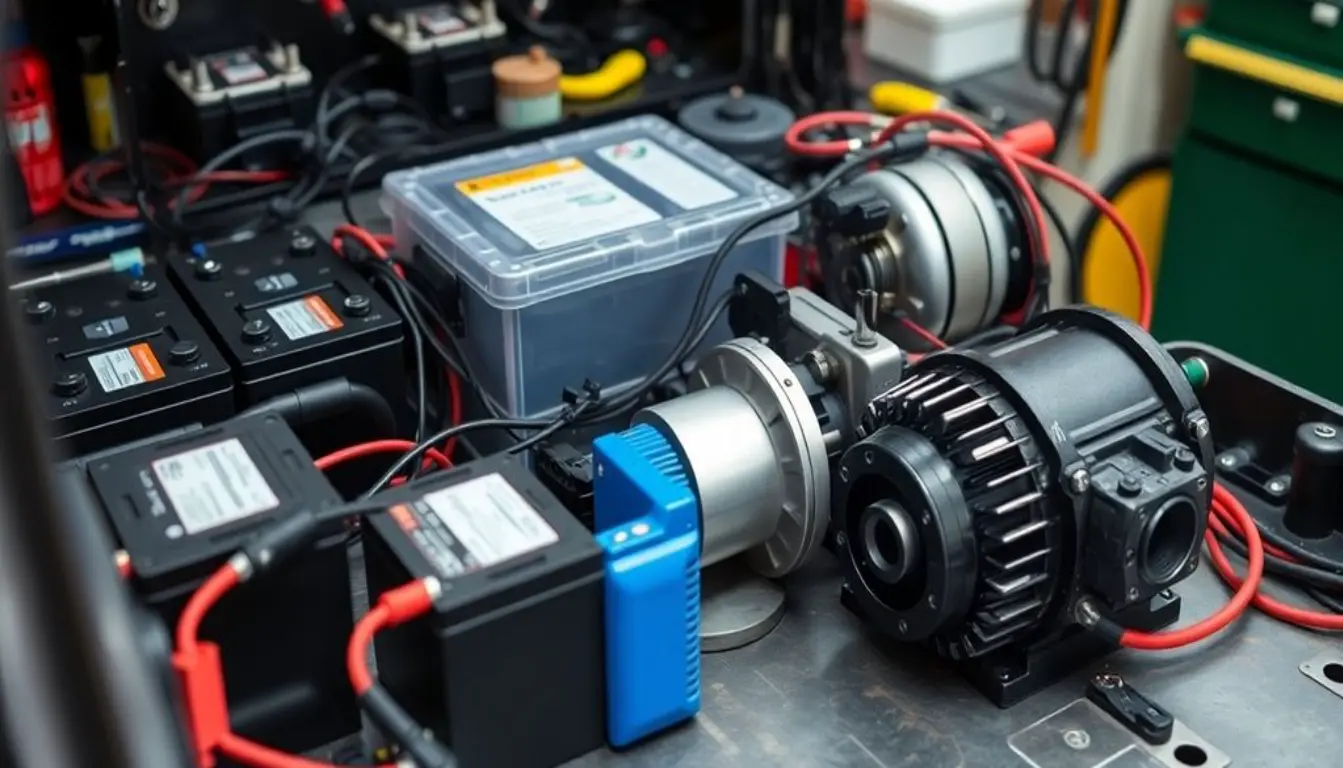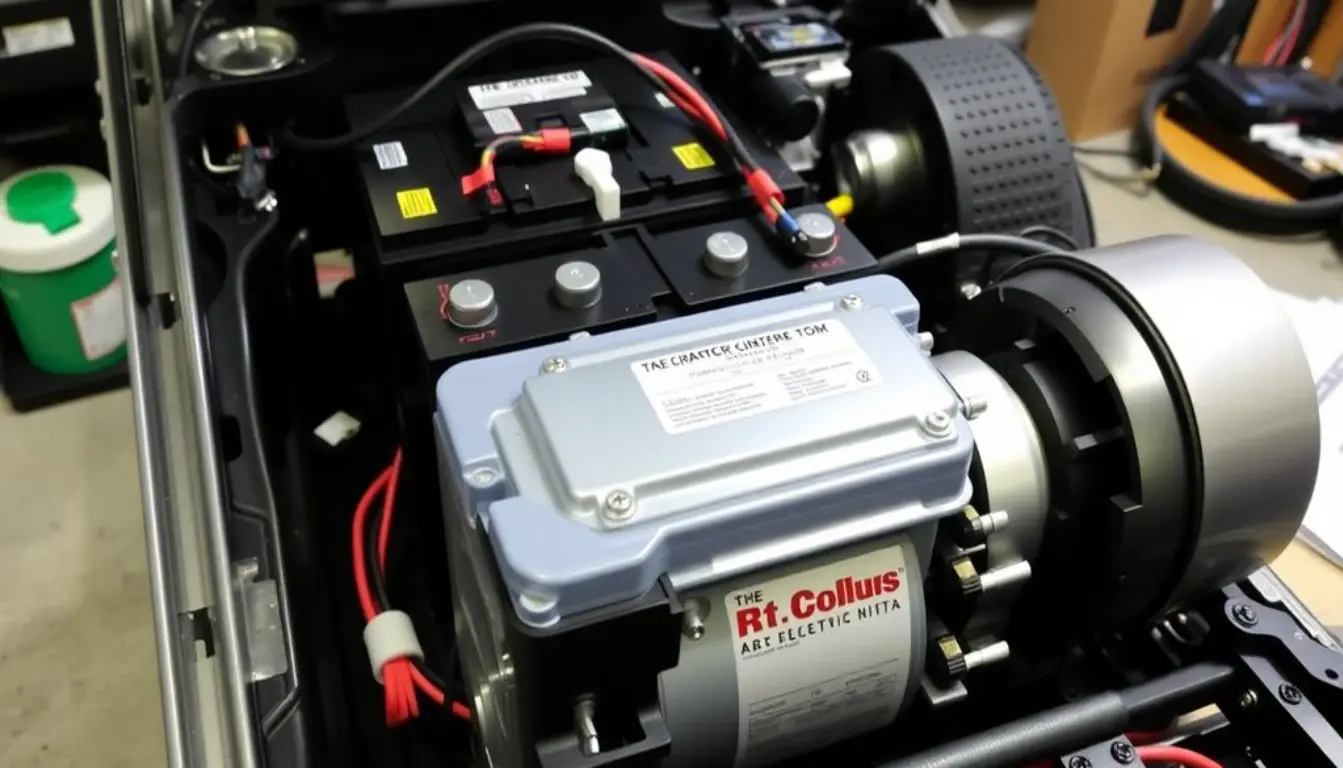
Converting your vehicle to electric power is a smart move that can save money and help the environment. Whether you have a small car, a truck, or a classic vehicle, there are many conversion kits available to fit your needs. This guide will help you understand the best options, key components, and the overall process of converting your vehicle to electric.
Key Takeaways
- Electric vehicle conversion kits are available for various types of vehicles, including small cars, trucks, and classic cars.
- Key components of these kits include electric motors, battery systems, and inverters.
- When choosing a conversion kit, consider your vehicle’s compatibility, your budget, and whether you want to install it yourself or hire a professional.
- Top companies for EV conversion kits include EV West, NetGain Motors, and Hypercraft.
- Converting to electric can reduce your carbon footprint, save on fuel costs, and improve your vehicle’s performance.
Top EV Conversion Kits for Different Vehicle Types
Best Kits for Small Cars
When it comes to small cars, the NetGain economy kit is a top choice. This kit is designed for easy installation and offers great performance. It features a NetGain 156-volt electric motor and an Orion battery pack, providing up to 120 peak horsepower and 162 ft-lb of torque. This makes it perfect for those looking to convert their compact vehicles into electric ones.
Best Kits for Trucks and SUVs
For larger vehicles like trucks and SUVs, the 235 HP plug & play kit by DIYev stands out. This powerful kit includes a fully assembled Parker Hannifin R-Series Motor System and an Orion battery pack. It’s designed for heavy-duty builds, making it ideal for those who need extra power for hauling or off-roading.
Best Kits for Classic Cars
Converting classic cars to electric is becoming increasingly popular. The Universal 80kW EV Motor Kit from Inductive Autoworks is a fantastic option. This kit includes everything you need to transform your classic ride into an electric vehicle. It’s perfect for those who want to keep the charm of their classic car while enjoying modern technology. As noted, we take a look at what it takes to convert a classic car to electric power, as well as some of the best examples produced to date.
| Vehicle Type | Kit Name | Key Features |
|---|---|---|
| Small Cars | NetGain Economy Kit | 120 HP, 162 ft-lb torque |
| Trucks/SUVs | 235 HP Plug & Play Kit | Heavy-duty, powerful motor system |
| Classic Cars | Universal 80kW EV Motor Kit | Complete package for classic car conversions |
Key Components of an Electric Vehicle Conversion Kit

Converting a vehicle to electric involves several critical components that work together to create a functional electric vehicle. Here are the main parts you need to consider:
Electric Motors and Controllers
- Electric Motor: This is the heart of the EV, converting electrical energy into mechanical energy to drive the wheels.
- Controller: It manages the power flow from the battery to the motor, ensuring smooth acceleration and deceleration.
Battery Systems and Management
- Battery Pack: Stores energy for the electric motor. Common types include lithium-ion and lead-acid batteries.
- Battery Management System (BMS): Monitors the battery’s health, ensuring it operates safely and efficiently.
Inverters and Power Distribution
- Inverter: Converts direct current (DC) from the battery into alternating current (AC) for the motor.
- Power Distribution Unit (PDU): Distributes electrical power to various components of the vehicle, ensuring everything gets the energy it needs.
| Component | Function |
|---|---|
| Electric Motor | Converts electrical energy to mechanical energy |
| Controller | Manages power flow to the motor |
| Battery Pack | Stores energy for the motor |
| BMS | Monitors battery health |
| Inverter | Converts DC to AC |
| PDU | Distributes power to components |
Understanding these components is essential for a successful conversion. Each part plays a vital role in ensuring your electric vehicle runs smoothly and efficiently.
By knowing these key components, you can make informed decisions when selecting an EV conversion kit for your vehicle.
How to Choose the Right EV Conversion Kit

Choosing the right EV conversion kit can be a bit tricky, but it’s important to get it right. Here are some key points to consider:
Assessing Your Vehicle’s Compatibility
- Check your vehicle type: Not all kits fit every vehicle. Make sure the kit is designed for your specific model.
- Weight and size: Ensure the kit can handle your vehicle’s weight and size.
Budget Considerations
- Total cost: Look at the full price, including parts and installation.
- Hidden costs: Don’t forget about potential extra expenses like tools or additional parts.
DIY vs. Professional Installation
- DIY: If you’re handy and enjoy working on cars, a DIY kit might be for you. It can save money but requires skills.
- Professional: If you want a hassle-free experience, consider hiring a professional. It may cost more but can save time and ensure quality.
Choosing the right electric motor for your EV build is crucial. To confidently choose the right motor, you need to first understand the key factors for comparing and contrasting the different motor makes and models.
In summary, take your time to research and consider your options carefully. This will help you make the best choice for your electric vehicle conversion.
Top Companies Offering EV Conversion Kits

When it comes to converting your vehicle to electric, several companies stand out in the market. Here are some of the top players:
EV West
EV West is a leader in the electric vehicle conversion industry. They offer a wide range of high-quality kits and components. Their expertise lies in transforming classic cars into electric beauties, making them a favorite among enthusiasts. They provide everything from electric motors to charging stations, ensuring a complete conversion experience.
NetGain Motors
NetGain Motors is known for its powerful electric motors. They supply a variety of motors suitable for different vehicle types. Their products are designed for high efficiency and torque, making them a top choice for serious EV converters. They have been in the business since 1998, providing reliable motors for various needs.
Hypercraft
Hypercraft offers innovative EV platforms that are modular and scalable. This means their systems can fit various vehicle types and sizes. They focus on providing complete powertrain solutions, making it easier for DIY enthusiasts to convert their vehicles.
| Company | Specialization | Notable Products |
|---|---|---|
| EV West | Classic car conversions | Complete conversion kits |
| NetGain Motors | Electric motors | HyPer, WarP, ImPulse motors |
| Hypercraft | Modular EV platforms | Complete powertrain systems |
Converting your vehicle to electric not only helps the environment but also enhances performance and efficiency.
These companies are paving the way for a greener future, making it easier for anyone to switch to electric vehicles.
Step-by-Step Guide to Converting Your Vehicle to Electric
Converting your vehicle to electric can be an exciting project. Here’s a simple guide to help you through the process.
Preparing Your Vehicle
- Choose the right vehicle: Not all vehicles are suitable for conversion. Small cars, trucks, and classic cars can work well.
- Gather necessary tools: You will need basic tools like wrenches, screwdrivers, and safety gear.
- Remove the old engine: Carefully take out the internal combustion engine (ICE) and any related components.
Installing the Electric Motor
- Select an electric motor: Choose a motor that fits your vehicle’s size and weight. Popular options include:
- AC motors for better efficiency
- DC motors for simpler setups
- Mount the motor: Secure the motor in place, ensuring it aligns with the transmission.
- Connect the controller: This device manages the power from the battery to the motor.
Integrating the Battery System
- Choose a battery type: Lithium-ion batteries are common due to their efficiency and lifespan.
- Install the battery pack: Find a safe location in your vehicle to place the batteries, ensuring they are secure and well-ventilated.
- Connect the battery management system (BMS): This system monitors the battery’s health and performance.
Remember: Safety is key! Always wear protective gear and follow guidelines.
By following these steps, you can successfully convert your vehicle to electric. Enjoy the ride!
Benefits of Converting Your Vehicle to Electric
Environmental Impact
Converting your vehicle to electric helps reduce pollution. Electric vehicles (EVs) produce zero tailpipe emissions, which means cleaner air for everyone. This is a big step towards a healthier planet.
Cost Savings
Switching to an electric vehicle can lead to significant savings. For example, one of your main cars being electric could save your household approximately $500–$1,000 on fuel costs per year. This is a great way to save money in the long run.
Performance Enhancements
Electric vehicles often provide better performance than traditional cars. They can accelerate faster and have smoother rides. Many drivers report that their electric cars feel more powerful and responsive.
Making the switch to electric is not just about saving money; it’s also about enjoying a better driving experience.
Summary Table of Benefits
| Benefit | Description |
|---|---|
| Environmental Impact | Zero tailpipe emissions, cleaner air |
| Cost Savings | $500–$1,000 savings on fuel annually |
| Performance Enhancements | Faster acceleration, smoother rides |
In conclusion, converting your vehicle to electric offers numerous advantages, from saving money to improving performance and helping the environment. It’s a win-win situation!
Common Challenges and Solutions in EV Conversions

Converting a vehicle to electric can be exciting, but it also comes with its own set of challenges. Here are some common issues and how to tackle them:
Technical Difficulties
- Understanding the technology: Many people find the technology behind electric vehicles (EVs) complex. It’s important to educate yourself about electric motors, batteries, and controllers.
- Installation issues: Sometimes, the parts may not fit perfectly. Make sure to read the instructions carefully and consider watching tutorial videos.
Sourcing Quality Parts
- Finding reliable suppliers: Not all parts are created equal. Look for reputable companies that specialize in EV components. Check reviews and ask for recommendations.
- Cost concerns: Quality parts can be expensive. Set a budget and prioritize essential components first.
Legal and Regulatory Considerations
- Understanding local laws: Different areas have different regulations regarding EV conversions. Research your local laws to ensure compliance.
- Registration and insurance: After conversion, you may need to update your vehicle’s registration and insurance. Contact your local DMV for guidance.
Converting to electric can be a rewarding project, but it’s essential to be prepared for the challenges ahead.
| Challenge | Solution |
|---|---|
| Technical difficulties | Educate yourself and watch tutorials |
| Sourcing quality parts | Use reputable suppliers and check reviews |
| Legal considerations | Research local laws and regulations |
Wrapping Up Your Electric Vehicle Conversion Journey
In conclusion, converting your vehicle to electric is an exciting adventure that combines technology with personal passion. With the right electric vehicle conversion kit, you can keep the charm of your beloved car while enjoying modern benefits like better performance and lower running costs. Whether you choose a DIY approach or go for a plug-and-play kit, there are many options available to suit your needs. As the electric vehicle market continues to grow, now is a great time to consider making the switch. Embrace this change and enjoy the ride!
Frequently Asked Questions
What is an EV conversion kit?
An EV conversion kit is a set of parts that lets you change a regular car into an electric one. It usually includes an electric motor, batteries, and other necessary components.
Can any car be converted to electric?
Most cars can be converted, but you need to check if the kit fits your vehicle. Some cars work better than others for this change.
How much does it cost to convert a car to electric?
The cost can vary a lot. It depends on the type of kit you choose and whether you do the work yourself or hire someone. It can be anywhere from a few thousand to tens of thousands of dollars.
Is it hard to install an EV conversion kit?
It can be tricky if you don’t have experience with cars. Some people choose to do it themselves, while others prefer to hire professionals.
What are the benefits of converting to electric?
Converting to electric can save money on gas, help the environment, and give your car better performance.
Are there any legal issues with converting a car to electric?
Yes, there might be laws about emissions and safety that you need to follow. It’s a good idea to check local regulations before starting your project.